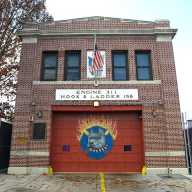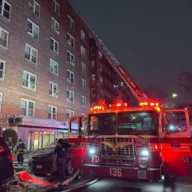A coalition of co-op and condo owners in northeast Queens had one message for its elected officials after arguments erupted over whose bill was best: no more lip service.
“What you see is the dysfunction in Albany. This isn’t a Republican-Democrat issue. It’s about homeowners who don’t want to be pushed out of their homes,” said Bob Friedrich, president of Glen Oaks Village Owners, Inc. and cofounder of the President’s Co-op Council.
The Council — which represents about 100,000 co-op shareholders — joined close to one dozen elected officials and more than 900 concerned Queens residents at North Shore Towers on April 12 to rally for action against the city for another year of property tax spikes.
While Friedrich said a solution could not be reached without the cooperation of state lawmakers, some electeds — with pointed fingers — turned the meeting into a heated political debate.
“There’s been a little too much lip service tonight. I sat here and got madder and madder as I listened to every speaker,” said Senator Tony Avella. “We had an opportunity last year, and we blew it because of politics on both sides of the aisle.”
Currently, there are three bills on the table in Albany on how to address the issue, which Avella said is a clear sign of disconnect between state leaders who he said may each be pushing for their own legislation to pass.
“It’s not that the Republicans don’t want to move the bill to address this — it’s which bill should they support? Which one gets passed? This has to stop. I don’t care if it’s my bill or somebody else’s bill, but this has got to stop. We’re not working together,” he said.
Avella’s own bill, which he called the “best solution,” would create a new property tax class — called Class 1A — for co-op and condo owners. He said the bill would provide the same protections that exist for Class 1 properties, capping any single yearly tax increase at 6 percent and 20 percent over a five year period.
An earlier law put forth by Assemblymember David Weprin would propose similar provisions, classifying co-ops as Class 1 and capping increases at the same percentage, while other legislation by Senator Toby Ann Stavisky and Assemblymember Ed Braunstein would see co-ops paying only 75 percent of their legal fees in a successful certiorari suit. They said the law would also stabilize assessments for two years following a successful challenge, capping spikes at 3 percent to prevent the necessity of an additional proceeding.
Councilmember Mark Weprin fired back, saying each elected official was in fact “working hard” together to create a solution by this year.
“With all due respect, you’re the one who hasn’t been to most of the meetings,” Weprin said. “This is a very delicate situation, but to say that people here are just giving lip service is just nonsense. This is not about whose bill we’re going to sponsor. We’re all trying to solve a problem here, and I think we’re all open to whatever solution we can get adopted that will save co-op owners. That’s the goal here, and that’s why I took a lot of offense.”
Senate and Assembly officials have only until the end of June this year to agree on one single bill and have it passed by both Houses, Weprin said. While the City Council is not directly involved in the legislation process, Weprin said councilmembers have an upper hand in trying to get the mayor on board.
“I’ve seen bills drafted, signed and passed in 12 hours. We just have to work together,” Weprin said. “I thought [the meeting] was a good case of democracy in action.”































